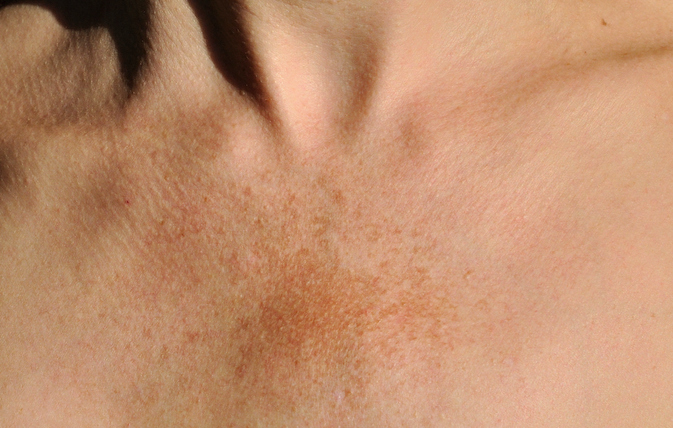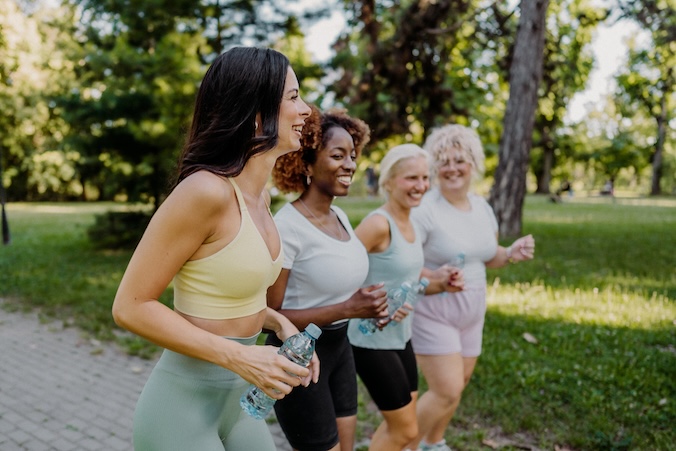The pioneering ingredient to help repair sun damaged skin

Today we're diving into the science behind sun damage and how the pioneering hero ingredient NMN (nicotinamide mononucleotide) featured in Regenerate, along with other potent antioxidants, can be your skin's shield from the inside after exposure to the sun’s UV rays.
What are UV rays?
UV, or ultraviolet, is a form of radiation energy from the sun, which comes in two forms. The first is UVA and the second is UVB. There is a third radiation type, UVC, which doesn’t originate from the sun, but is also harmful to the skin. UV light is invisible, as the wavelengths are too short for the human eye to pick up, but the effects coming from exposure are very real.
What is UVA?
This is the most common UV ray from the sun and the most dangerous. UVA rays can penetrate the skin down to the middle layer, which with over exposure can give you wrinkles, sun spots or even contribute towards forming skin cancer.
What is UVB?
This ray has a much shorter wavelength than UVA, which means it is only capable of penetrating the very top layer of the skin, however, this doesn’t mean that they’re any less damaging to your skin as they too can cause skin cancer, while also being responsible for skin cancer.
What is UVC?
Arguably the most dangerous type of UV radiation from the sun, UVC rays are stopped by the earth’s ozone layer so there is no exposure to UVC rays when sitting out in the sun; however exposure to UVC can still come from artificially generated light, such as lasers, mercury lamps or welding torches.
In short, all UV rays generated by the sun are dangerous, and can mess with your cells, causing a variety of issues that contribute to premature aging, such as; wrinkles, pigmentation woes, and loss of elasticity.
How can you protect yourself from UV skin damage?
Sun damage isn't just about getting red like a lobster; it can lead to wrinkles, freckles, and even cancerous cells. That's why you need to be sun-smart. Broadly speaking, SPF 30+ blocks up to 97% of the sun’s rays. You’ll need about 1oz (ounce) of sunscreen to cover your whole body and face; and you should look to reapply every two hours, or more often if you are sweating or swimming. The sun’s rays are at their strongest between 10am and 4pm, so err on the side of caution during this time window. Try not to depend solely on SPF cream protection, make sure you are wearing hats to protect the top of your head and face; also by seeking shade regularly.
You can also protect and repair your skin, by taking antioxidants and applying moisturiser as part of your normal skincare routine. These two activities fight the effects of sun damage and keeps your skin looking fresh.
Can food help you protect from sun damage?
Certain foods can help to protect your skin from sun damage. Antioxidants, vitamins, and minerals help your skin to battle those harmful UV rays. Berries, leafy greens, and citrus fruits contain powerful antioxidants that go head-to-head with free radicals from sun exposure. Omega-3 fatty acids from fatty fish, flaxseeds, and walnuts reduce inflammation and keep your skin hydrated. Vitamin E, found in almonds and sunflower seeds, works to bolster your skin’s protective barrier, helping to shield it from the elements.
What supplements will reduce the impacts of sun damage?
Now, let's talk about those ingredients which are your secret weapon against sun damage.
• NMN (Nicotinamide Mononucleotide): UV rays can sap your skin cells' energy and mess up your DNA. NMN steps in, by activating NAD (Nicotinamide Adenine Dinucleotide), a critical molecule that revives your cells. Increased NAD levels fix DNA, kicks UV-induced immune issues and fights inflammation. Plus, it's the gatekeeper that keeps moisture in, and the bad stuff out.
• Quercetin: This ingredient fights against UV rays and environmental stressors. This antioxidant douses inflammation and helps your skin to regenerate.
• Resveratrol: Resveratrol tackles sun-induced pigmentation and protects against UV damage.
• Pterostilbene: Pterostilbene also works to fight UVB damage. It boosts your skin's defenses, fixes DNA, and combats UV-induced radicals.
• Astaxanthin: Astaxanthin helps to fight signs of pigmentation. It’s also thought to help dry, aging skin by preventing moisture loss.
• Pine Bark: Many studies have shown how pine bark helps to reduce pigmentation and existing sun damage.
• Grape Seed Extract: Grape seed extract contains a high level of antioxidant protection to fight against harmful free radicals and photo ageing.
Can Rejuvenated supplements reduce the impact of sun damage?
Regenerate contains a powerful blend of eight powerful molecules. NMN increases NAD production and gives sirtuins the green light to fix damaged cells whilst fighting inflammation. But Regenerate isn't a one-ingredient wonder. It contains a clever cocktail of plant-based ingredients too. Pterostilbene, quercetin, and resveratrol band together to fight inflammation, while astragalus helps your DNA strands' protective caps (telomeres) stay in shape. With this dream team on your side, Regenerate is your skin's secret weapon against sun damage.
Bonus Round: H3O Night Repair
And don't forget the bedtime routine! Rejuvenated's H3O Night Repair – with hyaluronic acid, ionic minerals and a cocktail of antioxidant-rich vitamins – hydrates and repairs your skin while you snooze.
We all love soaking up the sun, but it's essential to protect your skin. Ingredient superstar NMN,as well as its other natural ingredients in Regenerate can boost your skin's defence system from the inside out. By nourishing your body with these mighty antioxidants and cellular champions, you can enjoy the sun without sacrificing your skin's youthful glow.






